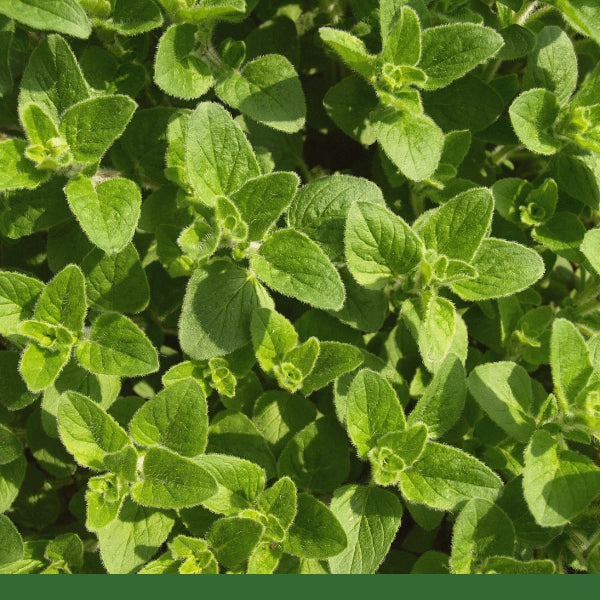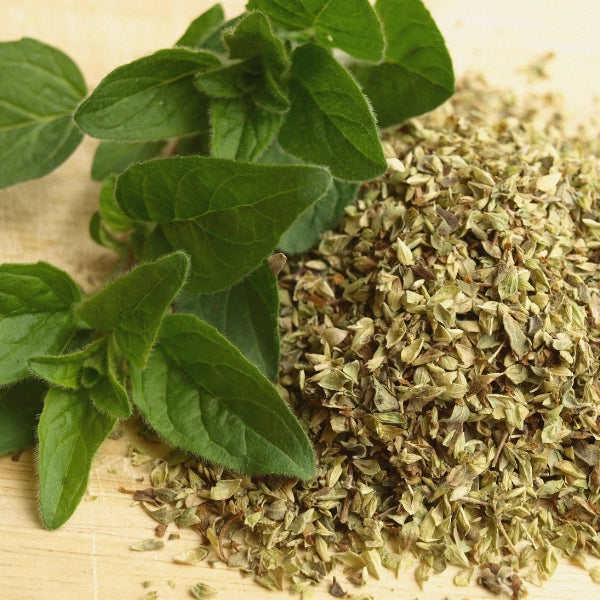Oregano Leaf, Whole (Origanum vulgare) - Dried Herb, Organic
- Regular price
- $12.91
- Sale price
- $12.91
- Regular price
-
- Unit price
- per
Couldn't load pickup availability


Oregano is hardy herbaceous perennial that is an evergreen, growing from 20–80cm tall with opposite dark green leaves that are 1–4cm long. The flowers are long pinkish purple erect spikes that bloom in late spring. Oregano reproduces from rhizome or the hermaphrodite flowers (have both male and female organs) and are pollinated by bees.
It is sometimes called Wild Marjoram, and it's close relative of Sweet Marjoram. Oregano is in the Lamiaceae family or Mint family, which includes other aromatic herbs like Sage, Thyme, Oregano, Hyssop and Lavender. Oregano likes to grow in warm, dry climates and is native to the Mediterranean, but has been naturalized all over the world. The best quality oregano is grown in a warm, dry climate because sunlight encourages the concentration of the volatile oils.
Oregano was originally grown in Greece, and the Greeks believed that this herb was created by the Goddess Aphrodite who wanted it to be a symbol of joy growing in her garden. The word “oregano” comes from the Greek words oros, meaning “mountain” and ganos for “joy” – “joy of the mountains”. Oregano was not widely used in the North America until after the Second World War when Soldiers discovered the herb during the Italian Campaign and brought it back to the US.
During the Elizabethan era Oregano was used to encourage good luck, good health, happiness, tranquility, protection and letting go of a loved one. Throughout history, Oregano was used primarily as a culinary spice in gardens and used to preserve meat. In the middle ages, Oregano was commonly used for medicinal purposes such as rheumatism, toothache, indigestion and coughs. In traditional Chinese medicine Oregano is used for the treatment of heat stroke, fever, acute gastroenteritis and respiratory disorders. In addition, the herb has been used in a gargling preparation to treat earaches, oral infections, gingivitis and toothaches.
Oregano is loaded with antioxidants that help prevent cell damage, fiber, vitamin K, manganese, iron, vitamin E, tryptophan and calcium.
Properties:
The taste and energetics of Oregano are aromatic, slightly bitter, pungent, warming and drying. Oregano has an affinity to the immune system, respiratory system, digestive system, liver, uterus, musculoskeletal system, mouth, throat and teeth. For a respiratory tea combine Oregano with Hyssop, Coltsfoot or Thyme. For an immune tea combine Oregano with Elderflower, Echinacea or Oregon Grape.
How to use:
1 teaspoon of Oregano to one cup of boiling water. Steep for 15 minutes, strain and drink up to three cups a day.
Or use in culinary dishes that include tomato-centric recipes, like pizza and pasta sauce, as well as olive oil-based dishes. Oregano is commonly combined with olive oil to create flavourful Oregano oil, Italian vinaigrettes, and marinades for lamb, chicken and beef dishes.
Cautions & contraindications:
Oregano can cause reactions in people allergic to Lamiaceae family plants, including Basil, Hyssop, Lavender, Marjoram, Mint and Sage.
This information is for educational purposes only and is not intended to diagnose, treat or cure any disease or illness. Please consult your healthcare provider prior to the use of this product if you are pregnant, nursing, taking medications or have a medical condition. Individual results may vary.

